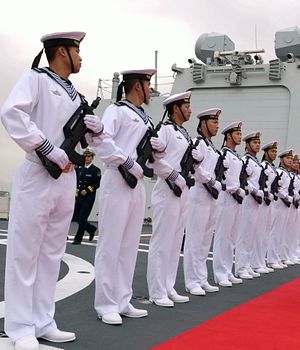The newly released U.S. National Defense Strategy, the first document of its kind in ten years, shifted U.S. security focus away from terrorism to a list of countries deemed “revisionist powers and rogue states.”
China, currently undergoing a major military reform, made the first among equals in the document. In the past five years, the Chinese People’s Liberation Army (PLA) has experienced monumental changes — shifting from an institution rife with corruption to a force advancing rapidly in high tech warfighting capabilities. Thus, it is not a surprise to witness growing U.S. anxiety at such an enduring competitor.
Now is an appropriate time to revisit the goals and especially the ideological drivers of China’s military reform in order to grasp the developmental trajectory of the PLA in the years ahead.
Xi’s Expectations
As the lead architect of PLA reforms, Chinese President Xi Jinping’s ideology matters enormously. Like most leader-centric ideologies in contemporary China, Xi’s thoughts on rebuilding the military are publicized in pithy slogans, which are now plastered across PLA barracks. While some might dismiss these catchphrases as nothing but platitudes, there are real-life implications behind these words.
“Obey the party’s commands, be able to win wars, and maintain good conduct” constitute the core of Xi’s expectations.
Unlike his predecessor, Xi maintains very close relations with the military, evident by his frequent appearances with PLA top brass as well as visits to military bases in all corners of China. In return, Xi demands absolute loyalty from PLA soldiers to the party and to himself. Obedience to Xi, the chairman of the Central Military Commission — the party’s top military decision-making body — is a means of reinforcing the unity of command, critical to any warfighting organization.
Following this line, we have witnessed an intensification of propaganda and indoctrination among Chinese troops. To critics, this seems like old-fashioned brainwashing. But to Chinese political warfare specialists, more indoctrination is their way of combatting perceived U.S. and Western ideological warfare. In the Chinese view, U.S. ideological warfare was one of the main causes behind the collapse of the Soviet Union. Due to Soviet state negligence, U.S. influence operations penetrated all levels of Soviet society. The spread of liberal ideology even captured the mind of Soviet leader Mikhail Gorbachev, who repeatedly clashed with conservative generals — straining the once robust unity of command.
Obeying the party’s commands, from the Chinese standpoint, is therefore a critical facet in building a new PLA resistant to external influence operations.
The principle of maintaining good conduct, however, has more to do with the PLA’s own troubles, mainly the issue of corruption. Military corruption reached a high point during Hu Jintao’s time in office and Xi took immediate action soon after he assumed the helm. However, similar to its civilian counterpart, the anti-corruption campaign in the military is not without its political aims. Xi’s opponents were targeted and their associates taken down. The old class of officers promoted by previous leaders were squeezed out while new blood with fresh ideas about modern warfare were brought in as replacements.
Ultimately, we can say the goal of the anti-corruption campaign is to create a clean, youthful army that can fight and win modern wars.
The motto of “be able to win wars” raises the question of what kind of war is China preparing for. To answer this question, we have to look no further than China’s military doctrine of “winning local wars under informationized conditions (打赢信息化条件下的局部战争).”
Winning Local Wars Under Informationized Conditions
We can better understand China’s military doctrine by breaking it down into two parts.
“Local wars” alludes to wars on China’s borders with limited objectives and duration. This is in contrast to global total wars with nuclear weapons, which China prepared for under Mao Zedong.
“Informationized conditions” refers to the penetration of information technology into all walks of modern life, including warfighting. War in the information age is network-centric, where domination in the information realm determines one’s capability to dominate combat in all other domains.
Under such conditions, China seeks to hone its ability to wage information operations, which includes the following: electronic warfare, computer network warfare, psychological warfare, military deception, operations security, and physical destruction (with precision-guided munitions). Using a combination of the above, the Chinese military plans to turn its information advantage to information superiority and finally information dominance, where the PLA’s information networks are completely secured while its adversary’s networks are totally paralyzed. The PLA seeks to hit critical nodes within its adversary’s C4ISR system (Command, Control, Communications, Computers, Intelligence, Surveillance, and Reconnaissance) and achieve its goals with soft and hard kills. (Soft kill here refers to network and electronic attacks, while hard kill is about the destruction of physical assets.)
This explains impressive Chinese advances in armaments designed for domination in the information realm — anti-radiation missiles, electronic attack drones, direct-energy weapons, airborne early warning and control system, anti-satellite weapons, and the cyber army under the Strategic Support Force, etc. Chinese scholars are publishing more on new modes of warfighting such as joint operations and space-based operations, all the while translating foreign military writings at a higher rate than before. In addition, we must also take note that information operations occur during peacetime as well. An example would be China’s influence operations abroad aimed at shaping foreign public opinion, which could benefit China in a time of conflict.
On the morning of January 3, Xi ordered PLA troops at a nationwide mobilization event to begin a new year of intensified training. Looking ahead, the trend of PLA reforms will lead to a higher degree of unity, both in command and in ideology, and greater informationization in PLA warfighting capabilities that will allow the Chinses military to speedily establish dominance in the world of information.

































